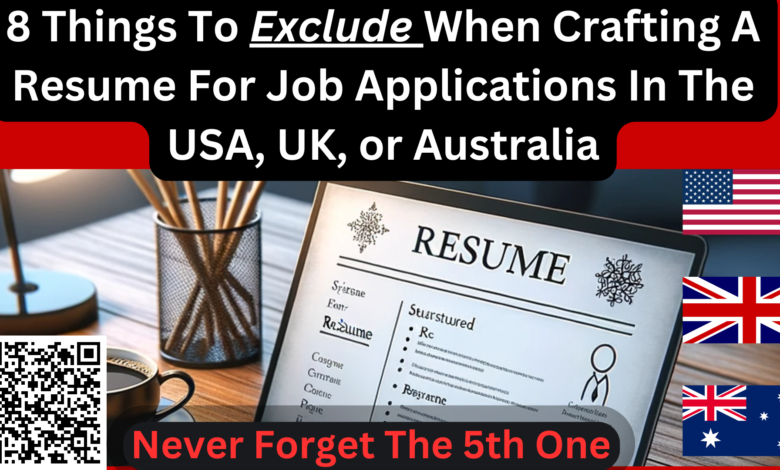8 Things To Exclude When Crafting A Resume For Job Applications In The USA, UK, or Australia(Never Forget The 5th One).

A resume is a formal document that summarizes an individual’s education, work experience, skills, achievements, and qualifications for the purpose of applying for a job. It is typically the first impression a potential employer has of a candidate and serves as a tool to showcase one’s abilities and suitability for a specific position.
ALSO READ: Apply For The Artificial Intelligence Development Fund in Nigeria (5 Million Naira in Funding)
A well-written resume provides a concise overview of a person’s professional background, highlighting relevant accomplishments, responsibilities, and skills that align with the requirements of the desired job. It should be tailored to the specific role or industry, ensuring that the most relevant information is presented in a clear and organized manner.
When crafting a resume for job applications in the USA, UK, or Australia, it is crucial to understand what information should be excluded to present a professional and effective document. Here are eight things you should never include in your resume:
- Personal Information: Avoid including personal details such as your marital status, date of birth, religion, or nationality. In these countries, employers are prohibited from making hiring decisions based on such information, and including it can potentially lead to discrimination.
- Photographs: Unless specifically requested, refrain from attaching a photograph to your resume. Hiring decisions should be based solely on qualifications and experience, and including a photo can introduce unconscious biases into the process.
- Irrelevant Work Experience: Only include work experience that is relevant to the position you are applying for. Including every single job you have held, especially if they are unrelated, can make your resume unnecessarily lengthy and dilute the impact of your relevant experience.
- Objective Statement: It is becoming increasingly common to exclude an objective statement from resumes. Instead, focus on a well-crafted professional summary or a career highlight section that highlights your skills, experiences, and achievements related to the specific role you are applying for.
- Unprofessional Email Addresses: Ensure that the email address you provide on your resume appears professional. Using email addresses that include nicknames, slang, or inappropriate words can create a negative impression. It is advisable to use a simple and straightforward email address that includes your full name.
- Hobbies and Interests: While it is important to showcase your personality, including a list of hobbies and interests on your resume is generally unnecessary. Employers are primarily interested in your professional qualifications, skills, and experiences related to the job. Only mention hobbies or interests if they are directly relevant or can demonstrate transferable skills.
- Negative or Controversial Content: Avoid including any negative or controversial information on your resume. This includes details about past conflicts, legal issues, or negative experiences with previous employers. Maintain a positive and professional tone throughout your resume.
- References: It is not necessary to provide references on your resume. Instead, you can state “References available upon request.” If an employer wants to check your references, they will typically ask for them separately. Prepare a separate document with your references’ contact information and have it ready when requested.
ALSO READ:Apply For The Artificial Intelligence Development Fund in Nigeria (5 Million Naira in Funding)
Remember, the goal of a resume is to effectively and concisely communicate your qualifications and suitability for the position you are applying for. By excluding irrelevant or unprofessional details, you can create a focused and impactful resume that increases your chances of securing an interview and ultimately landing the job you desire.
The terms “CV” (Curriculum Vitae) and “resume” are often used interchangeably, but there are some key differences between the two:
- Length: A resume is typically shorter and concise, usually limited to one or two pages. In contrast, a CV can be longer and more detailed, especially in academic or research fields, and may span multiple pages.
- Content Focus: A resume is tailored for specific job applications and emphasizes relevant skills, work experience, and achievements. It is often targeted towards a particular industry or position. On the other hand, a CV provides a comprehensive overview of an individual’s entire academic and professional history, including publications, presentations, research experience, teaching experience, and more. It tends to be more comprehensive and covers a broader range of information.
- Usage: Resumes are commonly used in the United States and Canada when applying for non-academic jobs, internships, or entry-level positions. CVs are commonly used in European countries, Australia, New Zealand, and some Asian countries for academic, research, or scientific positions. However, the usage of CVs vs. resumes can vary across industries and organizations.
- Structure: While both documents include sections like education, work experience, and skills, the order and emphasis can differ. Resumes typically highlight work experience first, followed by education and skills, whereas CVs often prioritize education and academic accomplishments, placing work experience later.
It’s important to note that conventions may vary depending on cultural norms, regional preferences, or specific employer requirements. In some cases, the terms “CV” and “resume” might be used interchangeably, so it’s always a good idea to check the specific expectations of the organization or job application to ensure that you’re providing the appropriate document.
Join Our Social Platforms For More Updates:
|| WhatsApp Group || Facebook Group || LinkedIn Group || Telegram Channel ||




